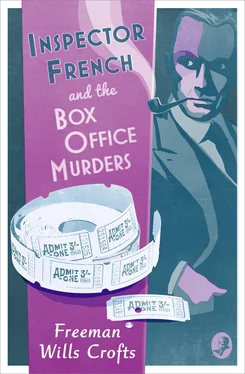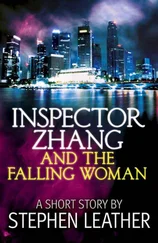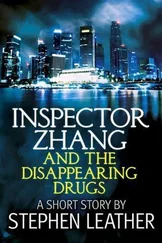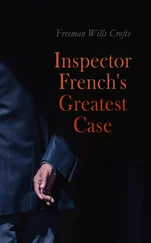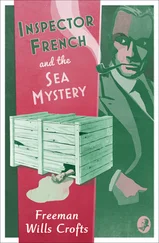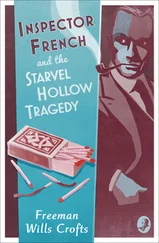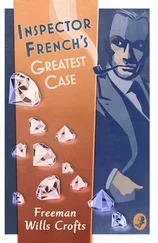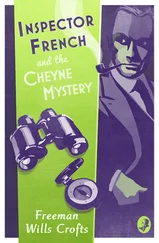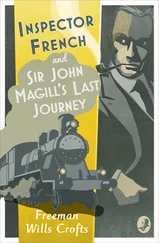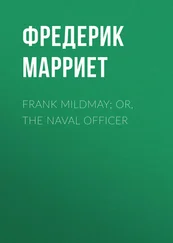‘She thought you were in some difficulty and wanted to do you a good turn?’
‘It was more than that, Mr French. She knew all about my difficulty, for I had told her. But she believed I was in danger and thought somebody should be told about it.’
‘In danger? In danger of what?’
The girl shivered.
‘Of my life, Mr French,’ she said in a low tone.
French looked at her more keenly. In spite of this surprising reply there was nothing melodramatic in her manner. But he now saw that her emotion was more than mere nervousness. She was in point of fact in a state of acute terror. Whatever this danger might be, it was clear that she was fully convinced of its reality and imminence.
‘But what are you afraid may happen to you?’ he persisted.
Again she shivered. ‘I may be murdered,’ she declared and her voice dropped to a whisper.
‘Oh, come now, my dear young lady, people are not murdered in an offhand way like that! Surely you are mistaken? Tell me all about it.’ His voice was kind, though slightly testy.
She made an obvious effort for composure.
‘It was Eileen Tucker. She was my best friend. They said she committed suicide. But she didn’t, Mr French! I’m certain she never did. She was murdered! As sure as we’re here, she was murdered! And I may be too!’ In spite of her evident efforts for self-control, the girl’s voice got shrill and she began jerking about in her chair.
‘There now,’ French said soothingly. ‘Pull yourself together. You’re quite safe here at all events. Now don’t be in a hurry or we’ll get mixed up. Take your own time and tell me everything from the beginning. Start with yourself. Your name is Thurza Darke. Very good now; where do you live?’ He took out his notebook and prepared to write.
His quiet, methodical manner steadied the girl and she answered more calmly.
‘At 17 Orlando Street, Clapham. It’s a boarding house kept by a Mrs Peters.’
‘You’re not a Londoner?’
‘No; I come from Birkenhead. But my parents are dead and I have been on my own for years.’
‘Quite. You are in some job?’
‘I’m in charge of one of the box offices at the Milan Cinema in Oxford Street.’
‘I see. And your friend, Miss Jennie Cox, who also lives at Mrs Peter’s boarding house, is typist to Mr Arrowsmith. I think I’ve got that straight. Now you mentioned another young lady—at least I presume she was a young lady—a Miss Eileen Tucker. Who was she?’
‘She was in one of the box offices at the Hammersmith Cinema.’
‘Same kind of job as your own?’
‘Yes. I met her at an evening class in arithmetic that we were both attending and we made friends. We were both bad at figures and we found it came against us at our work.’
French nodded. The name, Eileen Tucker, touched a chord of memory, though he could not remember where he had heard it. He picked up his desk telephone.
‘Bring me any papers we have relative to the suicide of a girl called Eileen Tucker.’
In a few moments a file was before him. A glance through it brought the case back to him. It was summarised in a cutting from the Mid-Country Gazette of the 10th January of that year. It read:
‘TRAGIC DEATH OF A YOUNG GIRL.
‘Dr J. S. Jordan, deputy coroner for South Eastern Surrey, held an inquest at the Crown Inn, Caterham, yesterday morning, on the body of a young girl which was found in a quarry hole about a mile from the town and not far from the road to Redhill. The discovery was made by a labourer named Thomas Binks, who was taking a short cut across the country to his work. Binks reported the affair to the police and Sergeant Knowles immediately visited the scene and had the body conveyed to the town. The remains were those of a girl of about twenty-five, and were clothed in a brown cloth coat with fur at the collar and cuffs, a brown skirt and jumper and beige shoes and stockings. A brown felt hat lay in the water a few feet away and in the right hand was clasped a vanity bag, containing a cigarette case and holder, some loose coins and a letter. This last was practically illegible from the water, but enough could be made out to show that it was from a man of undecipherable name, breaking off an illicit relation as he was going to be married. Dr Adam Moody, Caterham, in giving evidence stated that death had occurred from drowning, that there were no marks of violence, and that the body had probably been in the water for two or three days. At first the identity of the deceased was a mystery, but Sergeant Knowles handled the affair with his usual skill and eventually discovered that she was a Miss Eileen Tucker, an employee in the box office of the Hammersmith Cinema in London. She seemed to have been alone in the world, having lived in a boarding house and no relatives being discoverable. After considering the evidence, the jury, with Mr John Wells as foreman, brought in a verdict of suicide while of unsound mind.’
‘A sad case,’ said French sympathetically when he had finished the paragraph. ‘I see that the jury brought in a verdict of suicide, but you think the poor young lady was murdered? Now, just tell me why you think so.’
‘I know it! I’m sure of it! She wasn’t the kind of girl to commit suicide.’
‘That may be, but you’ve surely something more definite to go on than that?’
‘No proof, but I’m as certain of it as if I had been there. But what she told me about the man shows it wasn’t what they said.’
‘I don’t quite follow you. What did she tell you?’
‘She was in trouble through some man, but not the kind of trouble the letter said. There was no love affair or anything of that kind. It was money.’
‘Money?’
‘Yes. I thought at first she had got into debt to this man and couldn’t pay and I offered to lend her what I could; it wasn’t very much. But she said it wouldn’t help her; that the man had her in his power and that she was frightened. I begged her to tell me particulars, but she wouldn’t. But she was frightened all right.’
‘I don’t want to suggest anything bad about the poor young lady, but doesn’t it look as if he had found her out in something that she shouldn’t have done? Tampering with the cinema cash, for example?’
Miss Darke looked distressed.
‘That was what I feared,’ she admitted, ‘but of course I didn’t let her know I suspected it. And of course I don’t know that it was that.’
French was frankly puzzled.
‘Well, but if all that’s true, it surely supplies a motive for suicide?’
‘It might have with another girl, but not with her. Besides there was the letter.’
‘Yes, you mentioned the letter before. Now how does the letter prove that it wasn’t suicide?’
Miss Darke paused before replying and when at last she spoke it was with less conviction.
‘I looked at it like this,’ she said. ‘From the letter it would be understood that some man had got her into trouble and then deserted her. From what she told me that wasn’t so, and from what I know of her it wasn’t so. But if that’s right there couldn’t have been any letter—not any real letter, I mean. I took it the letter had been written by the murderer and left in her bag to make it look like suicide.’
In spite of himself French was interested. This was a subtle point for a girl of the apparent mentality of this Miss Darke to evolve from her own unaided consciousness. Not, he felt, that there was anything in it. The probabilities were that the unfortunate Eileen Tucker had been deceived and deserted by the usual callous ruffian. Naturally she would not tell her friend. On the other hand he considered that Miss Darke was surprisingly correct in her appreciation of the psychological side of the affair. The older French grew, the more weight he gave to the argument that X hadn’t performed a certain action because he ‘wasn’t the sort of person to do it’; with due reservation of course and granted an adequate knowledge of X’s character.
Читать дальше
